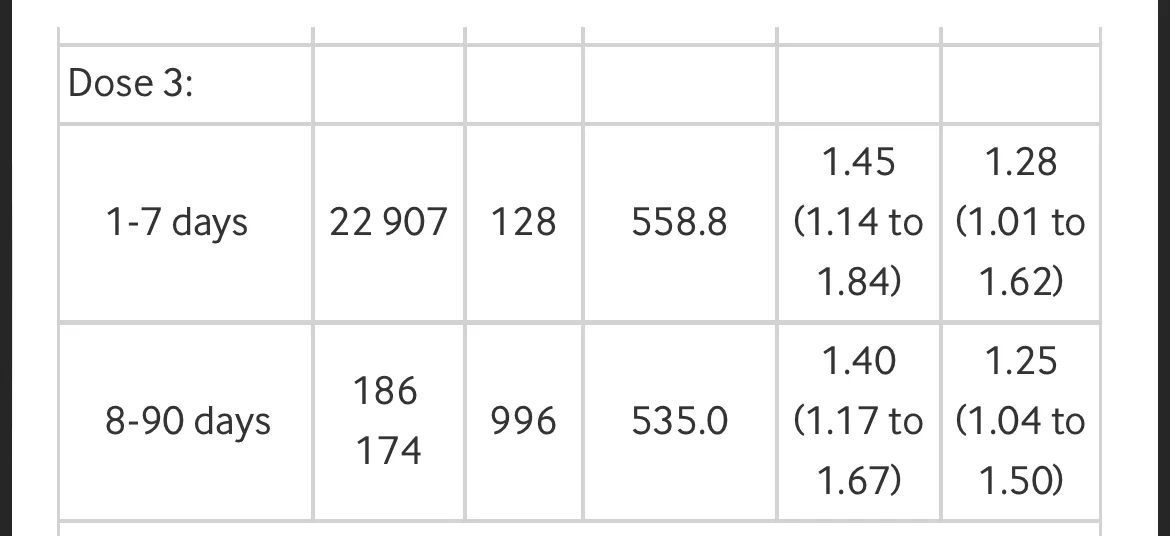by Alex Berenson, Unreported Truths:
 The researchers then tried to downplay their findings; welcome to the age of vaccine-apologetic science
The researchers then tried to downplay their findings; welcome to the age of vaccine-apologetic science
Women 45 and over had a high risk of severe vaginal bleeding after receiving mRNA Covid shots, Swedish researchers found after studying almost 3 million women.
The increased risk lasted for at least three months after women received a shot and was even higher after the third shot than the first two. That finding suggests what scientists call a “dose-response relationship,” strong evidence the link was not coincidence.
TRUTH LIVES on at https://sgtreport.tv/
Overall, a third mRNA dose raised the risk of severe, medically diagnosed bleeding episodes by 25-45 percent. Some women required inpatient hospital care.
Younger women also had a higher risk of bleeding episodes, although the researchers said hidden factors unrelated to the vaccine might have driven that finding.
Vaginal bleeding is not merely painful and uncomfortable. In about 9 percent of cases, severe bleeding episodes are a sign of cancer of the endometrium, the lining of the uterus. The researchers did not examine whether the extra bleeds were linked to increased diagnoses of endometrial cancer.
Because of its size and reliance on formal medical diagnoses rather than self-reporting of vaginal bleeding, the study offers the strongest evidence yet that the connection between Covid shots and bleeding is real.
Bizarrely, though, the researchers downplayed their own findings when they discussed the paper, which was published in the British Medical Journal.
Meanwhile, the Journal of the American Medical Association relegated the study to a three-paragraph summary in its “Medical News in Brief” section – and inaccurately reported that it had not found the jabs caused menstrual changes in women under 45. It did.
—
For the study, the researchers compared the likelihood a woman would be diagnosed with a new bleeding disorder up to one week and three months after being vaccinated with the same likelihood of diagnosis before vaccination.
The scientists drew on Sweden’s national medical records system, so they had a huge database, including 2.95 million women in Sweden aged 12-74. Of those, 2.58 million received at least one Covid jab and 1.65 million received three. The researchers divided women into two roughly equally-sized categories – 12-44 and 45 and over, whom they called post-menopausal. The study covered the period from December 2020, when vaccinations began, through February 2022.
After the third mRNA dose, post-menopausal women had over a 40 percent higher risk of severe bleeding. The risk lasted at least three months. It might have continued even longer, but the researchers did not examine time periods longer than three months after the shot.
Even after researchers corrected for factors other than the vaccine that might have caused the risk, they still found it was more than one-quarter higher. For all three doses combined, episodes of severe bleeding in older women rose by about 20 percent before correction and 15 percent after.
(Whole lotta bleeding going on: fifth column is the “crude” rate ratio, showing a 40-45 percent increased risk of severe vaginal bleeding. Sixth column shows the risk after researchers tried to correct for hidden factors.)

For younger women, bleeding rose by about 40 percent before correction but 10 percent after. It is possible the researchers overcorrected in ways that made the post-correction risk look smaller than it really is, but that question is very complex statistically.
In any case, the researchers found a statistically significant level of extra risk both before and after correction for both menstrual and postmenopausal bleeding.
These rates likely sharply understates the overall risk that the shots cause bleeding, because the study only captured bleeding episode severe enough to lead to a new formal diagnosis from a doctor Women with moderate bleeding would be likely to treat it themselves.
Read More @ alexberenson.substack.com



